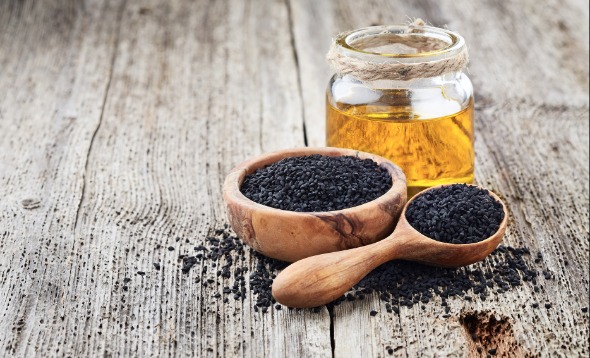That organic living is a conscious health choice
Black Seed Oil
For over two thousand years the black seed – or Nigella Sativa – a plant from the Ranunculaceae (buttercup) family, has traditionally been used by various cultures throughout the world as a natural remedy for several diseases and ailments and to improve health in general. The ancient Egyptians knew and used the black seed and hailed it as a panacea. Tutankhamun was found with a bottle of the oil in his tomb.
The black seed is also mentioned in the Bible in Isaiah 28:25-27 as the ‘fitches’. Ibn Senna, known in the West as Avicenna, who wrote the great medical treatise 'The Canon of Medicine', referred to the black seed as the seed ‘that stimulates the body's energy and helps recovery from fatigue.
Nigella Sativa originates from Western Asia and is a herb that grows about 16-24 inches in height and has white flowers when in bloom. The plant is now cultivated from the Near East to India. The deep black, sharp-cornered rectangular seeds (no longer than 3 mm) are the part of the plant that is used for the preparation of products.
Nigella Sativa is anti-inflammatory and has been used traditionally for the treatment of bronchial and other inflammatory diseases. It is also trusted as a natural remedy for a wide range of diseases including various allergies.
Besides its purported anti-microbial, cellular and antioxidant protection properties, Nigella Sativa also has a long tradition in the area of beauty care. In the Orient and at the latest since the 1st century in Europe, as recorded by Pliny, there are many recipes for maintaining and restoring beauty with the help of black cumin.
Black cumin seed, Nigella Sativa L., and its oils have traditionally been used for the treatment of bronchial diseases and other inflammatory diseases.
Thymoquinone (TQ) has been proposed to be one of the major active components of the seed. Since leukotrienes (LTs) are important mediators in bronchial conditions and inflammatory processes, the effects of TQ on leukotriene formation were studied in human blood cells. Findings demonstrate that TQ potently inhibits the formation of leukotrienes in human blood cells.
The inhibitory effect was dose and time-dependent and was exerted on both 5-lipoxygenase and LTC4 synthase activity.
ANTI-ALLERGIC / IMMUNE SUPPORT
Nigella Sativa (black seed) is used as a natural remedy for a wide range of diseases, including various allergies. An assessment of four studies including a total of 152 patients with allergic diseases (allergic rhinitis, bronchial asthma, atopic eczema) were treated with Nigella Sativa oil, given in capsules at a dose of 40 to 80 mg/kg/day.
The following laboratory parameters were investigated: IgE, eosinophil count, endogenous cortisol in plasma and urine, ACTH, triglycerides, total cholesterol, LDL and HDL cholesterol and lymphocyte subpopulations. The score of subjective feeling decreased over the course of treatment with black seed oil in all four studies. A slight decrease in plasma triglycerides and a discrete increase in HDL cholesterol occurred while the lymphocyte subpopulations, endogenous cortisol levels and ACTH release remained unchanged. Black seed oil therefore proved to be an effective adjuvant for the treatment of allergic diseases.
Prostaglandin E1 derived from the omega-6 series fatty acids found in black seed oil is a potent immune regulatory substance, particularly in participation with important phytonutrients such as thymoquinone.
CELLULAR PROTECTION
For centuries, the black seed herb and oil have been used in Asia, Middle East and Africa to promote health and fight disease. Thymoquinone (TQ), the most abundant constituent present in black seed, is a promising dietary cell-protecting agent.
An analysis of the phospholipids present in Nigella sativa revealed the following: The major individual PL classes were found to be phosphatidylcholine (46-48% of total PL) followed by phosphatidylethanolamine (PE), phosphatidylserine (PS) and phosphatidylinositol (PI), respectively. Phospholipids play key roles in supporting cellular membrane maintenance. The phyto-sterol Beta Sitosterol has been identified as a key marker in black seed oil, this compound has been shown to exert protective effects and reduce symptoms of Benign Prostatic Hyperplasia (BPH) Phyto-sterols exert effects on membrane structure and host tissue, signal transduction pathways that regulate immune function, and cholesterol metabolism by the host.
ANTIOXIDANT PROTECTION
Showed that thymoquinone and the components carvacrol, t-anethole and 4-terpineol demonstrated considerable radical scavenging property. Data indicates that Nigella sativa is acting mainly as a potent superoxide anion scavenger. Reducing the impact of toxic free radicals such as superoxide can help reduce the damage to cell membranes, particularly nerve cells within the brain.
ANTI-MICROBIAL
The antifungal activity of ether extract of Nigella sativa seed and its active principle thymoquinone has been tested against eight species of dermatophytes: four species of Trichophyton rubrum and one each of Trichophyton interdigitale, Trichophyton mentagrophytes, Epidermophyton floccosum and Microsporum canis. Results revealed the potentiality of Nigella sativa as a source for antidermatophyte drugs and support its use in folk medicine for the treatment of fungal skin infections. A further Turkish study, implemented at the Agricultural Faculty of the University of Erzurum in 1989, has also proved the anti-bacterial and anti-mycotic qualities of black seed oil.
FOR PROFESSIONAL USE ONLY
CARDIOVASCULAR SUPPORT
Black seed oil, which is prepared by compression of seeds of Nigella sativa L., showed inhibitory effects on arachidonic acid (AA)-induced platelet aggregation and blood coagulation. Aromatic compounds such as thymol and carvacrol are known to exert a more potent activity than aspirin, which is well known as a remedy for thrombosis. Black seed oil has been shown to decrease blood pressure and increase respiration. A Turkish study in 1985 at the University of Ankara described the effect of thymoquinone as bronchodilating, lung protective, and anti-histamine.
COSMETIC APPLICATION
Black cumin has a long tradition in the area of beauty care. In the Orient and at the latest since the 1st century in Europe, as recorded by Pliny, there are many recipes for maintaining and restoring beauty with the help of black cumin. Just like the skin, the hair also reflects the general condition of the body. Taking black cumin oil internally should therefore also contribute to healthy hair by regulating various bodily functions.
Culpeper’s Complete Herbal (17th Century) recommends massaging black seed oil into the scalp before washing to maximize hair care and prevent hair loss.
Dosage range: 1 tsp (5ml) per day for oral use. Higher levels can be used under the guidance of a nutritionally orientated physician. May be used topically as a massage oil, and as a chest rub for respiratory support.
Potential applications: respiratory complaints, fungal conditions e.g. candida (local/systemic), immune/cell support, allergies, eczema, psoriasis, rheumatoid/osteoarthritis, fatigue, acne, dry skin, dermatitis, dandruff, skin infections, atherosclerosis, elevated cholesterol/triglycerides.
Compositional Analysis reveals that Black Seed Oil is also a source of a broad range of nutrients: Vitamin A(Retinol), B1, B2, B3, B6, B12, Biotin, Folic Acid, Vit C, D3 (cholecalciferol), Vit E (alpha-tocopherol), calcium, potassium, iron, magnesium, selenium, zinc. Amino acids – aspartic acid, threonine, serine, glutamic acid, proline, glycine, alanine, valine, methionine, isoleucine, leucine, tyrosine, phenylalanine, histidine, and lysine.
Known contraindications: none known. The seeds are characterised by a very low degree of toxicity.
Note: Black seed oil is not recommended for use during pregnancy


























_1672804154.jpg)

_1611290459.jpg)